Cherishing Life's Little Moments: Small Wins in Parenting for Big Impact

Learn how cherishing life's little moments and celebrating small wins in parenting can make a big difference in raising confident kids and strengthening family bonds. Discover practical tips for mindful parenting and fostering emotional intelligence
I. The Unsung Power of Parenting's "Little Victories"
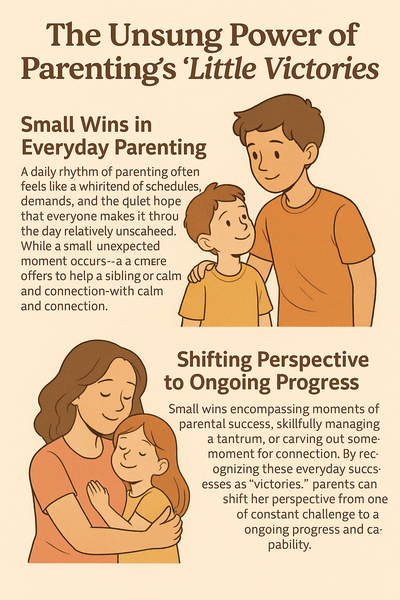
The daily rhythm of parenting often feels like a whirlwind of schedules, demands, and the quiet hope that everyone makes it through the day relatively unscathed. Consider the familiar morning rush: packing lunches, finding lost shoes, navigating breakfast negotiations. Then, a small, unexpected moment occurs – a child offers to help a sibling without prompting, or perhaps a parent successfully navigates a potential meltdown with calm and connection. These are the moments, often fleeting and unheralded, that form the true heart of a thriving family life. While grand milestones like first steps or graduations are rightfully celebrated, it is the accumulation of these "little victories" that subtly and powerfully shapes both children and their parents.
These small wins are not just about a child's achievements; they also encompass moments of parental success. It could be a parent resisting the urge to yell during a frustrating exchange, skillfully managing a toddler's tantrum (perhaps finding strategies for transforming toddler tantrums), or simply carving out a moment for genuine connection with their child. Such instances, though seemingly minor, are potent. They are often overlooked in the hustle of daily life, meaning their profound, scientifically-supported benefits for children's confidence, parental stress reduction, and overall family strength are not always fully realized. By recognizing these everyday successes as "victories," parents can shift their perspective from one of constant challenge to one of ongoing progress and capability. This understanding sets the stage for exploring the significant positive impact these small wins can have.
II. What Exactly Are "Small Wins" in Parenting? (Hint: They're Everywhere!)
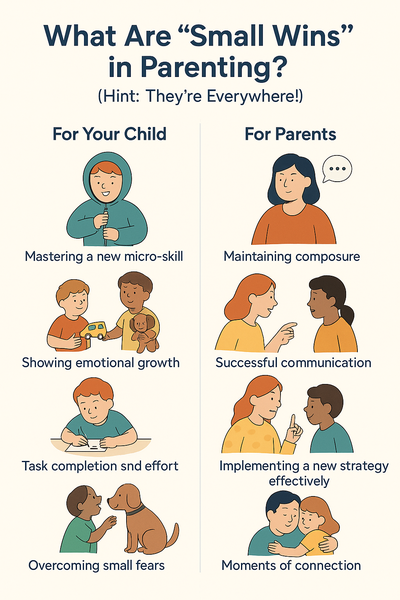
Small wins in parenting are the frequent, often subtle, positive moments and incremental steps that contribute to larger successes and overall well-being. They are the daily evidence of growth, effort, and connection, found in the actions of both children and parents. Recognizing these moments requires a conscious shift in perspective, moving beyond the major milestones to appreciate the progress woven into the fabric of everyday life. Exploring child developmental milestones can also provide context for these everyday wins.
These victories can be seen in various forms:
- For Your Child:
- Mastering a new micro-skill: This could be the triumph of independently zipping up a coat, forming a letter of the alphabet correctly for the first time, finally conquering shoelace tying, or successfully buckling their own car seat. These are all part of the learning ladders to early education success.
- Showing emotional growth: Moments such as a child expressing their feelings in a calm manner, spontaneously sharing a coveted toy, or offering help to a friend are significant wins.
- Task completion and effort: Finishing homework with focus, tidying up toys after a single reminder, or persevering with a challenging puzzle, even if it's not perfect, demonstrates valuable effort.
- Overcoming small fears: The courage shown when a child tentatively touches a new food, gently pets a friendly dog after initial hesitation, or climbs a little higher on the playground equipment than before are all noteworthy achievements.
- For Parents:
- Maintaining composure: Successfully keeping calm during a child's intense emotional outburst or resisting the urge to raise one's voice when feeling frustrated are significant personal victories. This aligns with principles of mindful parenting.
- Successful communication: Navigating a difficult conversation with a child constructively or taking the time to truly listen and validate their concerns represents a communication win. This is especially key when having meaningful conversations with your teen.
- Implementing a new strategy effectively: Consistently applying a new positive discipline technique or holding firm on an important boundary, even when challenging, is a mark of progress.
- Moments of connection: Sharing a spontaneous, heartfelt laugh, an unexpected hug, or enjoying a quiet, focused moment reading together are invaluable connection points.
The key is to understand that these wins are not about grand, flawless achievements but about acknowledging forward movement, positive behaviors, and genuine effort in the daily flow of family life. This broader definition is crucial because it highlights the interconnectedness of parental and child well-being. When parents recognize their own small successes – for instance, handling a difficult situation with patience – it bolsters their confidence and reduces stress. This enhanced parental state, in turn, makes them more attuned and emotionally available to notice and celebrate their children's small wins, creating a positive, upward spiral for the entire family. This approach democratizes "success," making it an accessible and daily experience rather than a rare event.
III. The Ripple Effect: How Small Wins Nurture Your Child's Growth
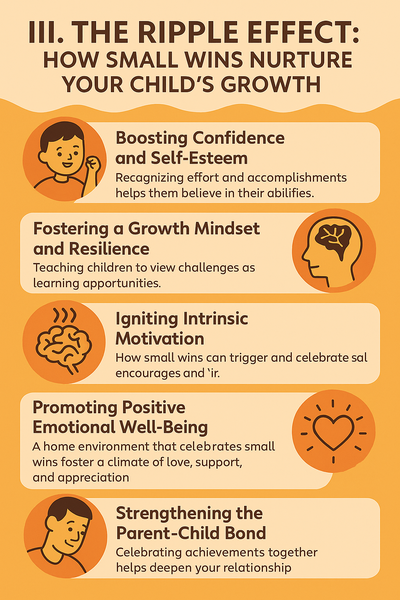
The practice of noticing and celebrating small wins has a profound and multifaceted positive impact on a child's development, creating ripples that extend far into their future.
- Boosting Confidence and Self-Esteem: When children's small efforts and accomplishments receive acknowledgment, it conveys powerful messages: "Your efforts are seen and valued," and "You are capable". This consistent validation acts as a cornerstone for building a robust sense of self-worth. Children who feel their contributions matter, no matter how small, develop a stronger belief in their own abilities, making them more adventurous and willing to try new things. This can be part of unlocking your child's potential.
- Fostering a Growth Mindset and Resilience: Celebrating the effort put forth and the progress made, rather than focusing solely on perfect outcomes, is instrumental in teaching children that abilities are not fixed but can be developed through dedication and hard work. This is the essence of a growth mindset. Children who internalize this belief learn to view challenges not as insurmountable threats, but as opportunities for learning and growth. This perspective is fundamental to building resilience, enabling them to bounce back more effectively from setbacks. The development of a growth mindset through these early experiences of celebrating small efforts is a foundational skill that has far-reaching implications, extending into academic pursuits and future professional success. When a child learns that persistence pays off, they are less fearful of failure and more willing to tackle difficult tasks.
- Igniting Intrinsic Motivation: The "Progress Principle" posits that making progress in meaningful work, even in small increments, is a powerful human motivator. When children experience these small wins, it can trigger a release of dopamine, a neurotransmitter associated with pleasure and reward. This "feel-good" chemical response reinforces the behavior, making the child more likely to want to repeat it. This process fuels intrinsic motivation – the desire to engage in an activity for the inherent satisfaction it brings, rather than for external rewards alone. This internal chemical reward system creates a positive feedback loop: a child attempts something, achieves a small win which is then celebrated, experiences a dopamine release, associates the effort with pleasure, and is consequently more motivated to persist and try again.
- Promoting Positive Emotional Well-Being: A home environment where small wins are consistently recognized and celebrated fosters a climate of love, support, and appreciation. This sense of emotional security is vital for healthy development. Children who feel safe, valued, and understood are better equipped to manage stress and are less prone to anxiety and depression. Creative activities can also boost children's mental health.
- Strengthening the Parent-Child Bond: The act of sharing in these moments of celebration, however minor they may seem, creates a repository of positive shared experiences. These interactions draw parents and children closer, deepening their connection and strengthening their bond. Discover more parenting hacks for building strong bonds.
IV. More Than Just "Good Job": The Perks for Parents Too!
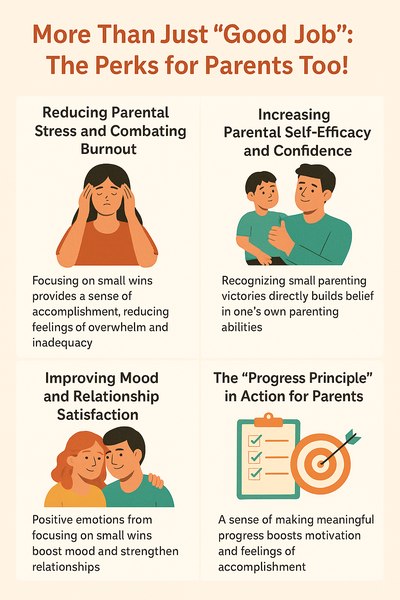
The benefits of acknowledging small wins extend significantly to parents, enhancing their well-being and enriching their parenting experience. This focus is not merely self-indulgent; a well-supported parent is better equipped to nurture their child.
- Reducing Parental Stress and Combating Burnout: The demands of parenting can often lead to a focus on challenges and what is not going smoothly. Actively seeking out and acknowledging small wins – both the child's and one's own – can powerfully shift this perspective. This positive reframing provides a sense of accomplishment and can reduce feelings of overwhelm and inadequacy, acting as a crucial buffer against parental burnout. Research indicates that positive reinforcement, even when self-directed, contributes to reduced stress levels.Family mindfulness activities can also contribute to a calmer home.
- Increasing Parental Self-Efficacy and Confidence: Parental self-efficacy refers to a parent's belief in their own capacity to parent effectively. Recognizing personal small parenting victories – such as maintaining calm during a tantrum or successfully navigating a tricky sibling disagreement – directly builds this self-belief. Instead of feeling defined by challenging moments, parents can begin to see themselves as "good parents who have bad moments," fostering greater confidence in their abilities. Understanding different parenting styles can also empower parents.
- Improving Mood and Relationship Satisfaction: The experience of positive emotions, often generated by celebrating these small wins, has been shown to enhance relationship satisfaction and the perception of partner support, particularly during demanding periods such as the transition to parenthood. According to the "broaden-and-build theory," these positive emotions are not trivial; they accumulate over time, building valuable psychological and social resources. This suggests that the simple act of noticing and appreciating a small win today can contribute to a parent's resilience and relational strength in the long term.
- The "Progress Principle" in Action for Parents: The Progress Principle, which highlights the motivational power of making progress in meaningful work, applies just as much to parents. Feeling a sense of advancement and accomplishment in the profoundly meaningful work of parenting boosts positive emotions, enhances motivation, and cultivates a stronger sense of achievement. This helps parents feel more intrinsically rewarded and engaged in their parenting role.
Ultimately, the enhanced well-being that parents experience from celebrating small wins creates a more positive and stable family environment. A parent who feels less stressed, more confident, and generally more positive is likely to be more patient, responsive, and emotionally available to their child. This emotional availability is a cornerstone of secure attachment and healthy child development, demonstrating that the "perks for parents" directly translate into better parenting and a more nurturing atmosphere for the child.
V. Weaving Celebration into Your Daily Family Life: Practical Ways to Spot and Cherish Small Wins

Incorporating the celebration of small wins into daily family life does not require elaborate gestures or expensive rewards. The true power lies in authenticity, consistency, and a genuine appreciation for progress. The first step is often the most crucial: consciously slowing down and paying attention to the myriad of small positive moments that occur each day. It is about the quality of attention paid to the present moment. The power of family meals can also provide a regular opportunity for these moments.
Here are some practical strategies for parents to spot and cherish these valuable small wins:
- Name the Win and Be Specific with Praise: Move beyond generic affirmations like "Good job!" Instead, pinpoint the specific behavior or effort being acknowledged. For example, "I noticed you shared your red crayon with your sister when she asked, that was very kind," or "You were so focused while building that tower, that shows great concentration!". Specificity makes the praise more meaningful and helps the child understand exactly what they did well, reinforcing that particular action.
- Focus on Effort Over Outcome: Praise the hard work, perseverance, courage, and strategies employed, regardless of the final result. A statement like, "I'm so proud of how hard you tried on that tricky math problem, even though it didn't turn out perfectly," reinforces a growth mindset. This teaches children that the process of learning and trying is highly valued.
- Create Simple Celebratory Rituals: These rituals make the acknowledgment of a win more tangible, memorable, and fun. They can be unique to each family.
- Examples: A special high-five or a unique family handshake, an impromptu "victory dance" , adding a marble to a "Win Jar" or a colorful note to a "Celebration Jar" for collective family wins or individual achievements , a special mention of the day's small victories at the dinner table , or using a sticker chart for repeated accomplishments or skill development.
- Keep a Gratitude or "Win" Journal: Regularly writing down small wins or things one is grateful for can solidify positive memories and promote overall well-being for both parents and children. Parents can keep a personal journal to reflect on their own parenting wins, or families can create a shared "milestone journal" to track and celebrate progress together.
- Share Successes with Loved Ones and As a Family: Talking about achievements – whether a child's or a parent's – with other family members or supportive friends reinforces the success and builds a network of encouragement. This can be integrated into family routines, such as sharing positive moments during dinner or dedicating a specific time for "Family Appreciation".
- Model Self-Appreciation (for parents): Children learn a great deal by observing their parents. Letting children hear parents acknowledge their own small wins, such as, "I'm really pleased I managed to stay patient during that hectic morning," models positive self-talk and self-compassion. This is a way to lead by example.
The process of identifying and celebrating small wins is, in itself, a skill that parents can cultivate and refine. Initially, it might require conscious effort, especially if one is accustomed to focusing on problems. However, with consistent practice, such as keeping a win journal or making a point to share positive moments daily, parents can train their attention to more readily notice the positives. This practice can evolve into a form of mindful parenting, where attention is intentionally directed towards the good, making the recognition of wins more natural and effortless over time. When families collectively engage in these practices, it can transform the entire family culture into one characterized by mutual appreciation, support, and a positive outlook, creating a powerful buffer against external stressors and strengthening family cohesion.
VI. Small Wins, Big Solutions: Tackling Common Parenting Hurdles
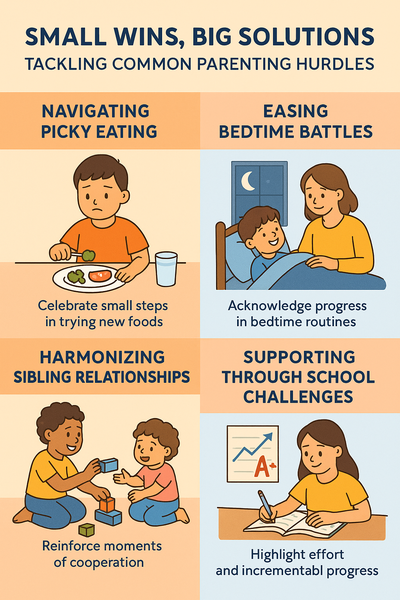
The principle of celebrating small wins is not merely a strategy for general child development; it is also a potent tool for navigating specific, often frustrating, parenting challenges. By shifting the focus to incremental progress, parents can transform these hurdles into opportunities for connection and skill-building.
- Navigating Picky Eating: Mealtimes with a picky eater can be a source of stress. Instead of focusing on the elusive goal of a "cleaned plate," parents can celebrate tiny steps of progress. For more ideas, check out these healthy recipes even the pickiest eaters will devour or learn how to turn your picky eater into a foodie with nutrition hacks.
- Acknowledging a child who simply touches, smells, or licks a new food is a victory. Recognizing when they try a tiny bite of a new food or add an extra, previously resisted vegetable to their plate are also important wins. You might also find inspiration in sneaky veggies recipes.
- This approach works because it reduces mealtime pressure, which often has the counterproductive effect of increasing resistance. When a child feels more in control and less coerced, their openness to trying new things can gradually increase. Patience and persistence are vital in this journey, and celebrating small wins provides the encouragement for parents to continue offering new foods in a positive manner.
- Easing Bedtime Battles (Sleep Challenges): Sleep difficulties can be exhausting for the whole family. Rather than viewing "sleeping through the night" as the only acceptable win, parents can focus on consistency in routines and small positive shifts. Understanding the importance of sleep for children's health and development can provide helpful context.
- A child staying in bed calmly for a few extra minutes, a parent consistently and patiently following a soothing bedtime routine, or a night with a noticeable reduction in crying (if a particular sleep training method is being followed where this is tracked) can all be acknowledged as progress. For more detailed guidance, explore the ultimate guide to baby sleep.
- This strategy helps by breaking down an overwhelming goal into more manageable parts. The parent's own consistency in applying a calm routine is a win in itself, contributing to eventual success. It is important to approach sleep with an understanding of different methodologies and to prioritize what feels right and supportive for the family.
- Harmonizing Sibling Relationships: Sibling interactions can range from delightful to deeply challenging. Parents can foster more positive dynamics by actively looking for and praising moments of cooperation, sharing, or peaceful problem-solving, however fleeting they may be.
- Successful turn-taking, perhaps facilitated by a timer, one child offering comfort to another, or a child effectively using taught phrases like, "Please stop, I don't like that," instead of escalating a conflict, are all valuable small wins.
- Acknowledging these moments reinforces desired social behaviors. Furthermore, proactively dedicating positive one-on-one attention to each child can reduce the competition for parental attention, which often fuels rivalry, thereby creating more opportunities for cooperative and harmonious interactions.
- Supporting Through School and Learning Challenges: For children who find schoolwork or executive functions (like organization and task initiation) challenging, the academic environment can sometimes feel like a constant stream of negative feedback. Small wins are particularly crucial in these contexts.
- Parents and educators can celebrate achievements such as a child handing in most of their assignments (even if not all are perfect), a slight improvement in a grade, the completion of one step in a large project, mastering a new concept after struggling, more active participation in class, or simply demonstrating significant effort and persistence on a difficult task.
- This approach helps to build confidence, motivation, and a growth mindset in an area where a child might otherwise feel defeated or incapable. It allows them to see tangible progress and feel valued for their efforts, fostering resilience in the face of academic difficulties.
Applying the "small wins" strategy to these common challenges effectively reframes them. Instead of being sources of parental frustration and child distress, these situations become opportunities to connect, build specific skills, and reinforce a child's sense of capability. This approach also implicitly teaches children valuable metacognitive skills: they learn how to break down daunting tasks into smaller, more manageable steps and to recognize and appreciate their own progress, a vital life skill for self-regulation and future achievement.
VII. Conclusion: The Beautiful Mosaic of Everyday Moments
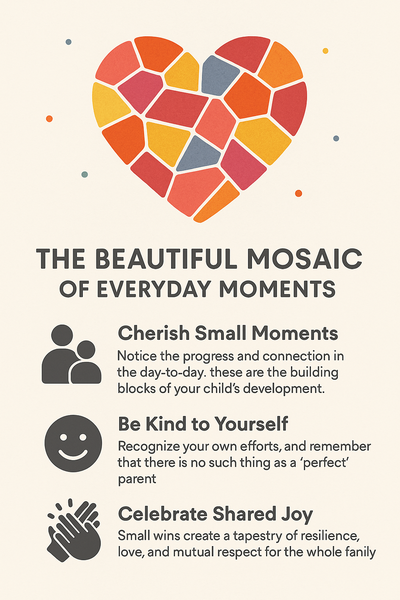
The grand and often overwhelming journey of parenting is, in reality, composed of countless seemingly small, everyday interactions and achievements. These are the "building blocks" that, piece by piece, create a strong foundation for a child's development and a resilient family unit. Cherishing these little moments is not about adding another burdensome task to a parent's already full plate; rather, it is about a gentle shift in perspective – an opening of the eyes to see the magic, progress, and connection already present in the daily tapestry of family life. You can find more insights on our blog.
It is also a call for parents to extend kindness and compassion towards themselves. Acknowledging their own efforts, celebrating their own small parenting victories, and remembering that challenging moments or "bad moments" do not define their worth as a parent are crucial for sustained well-being. The path of parenting is not one of perfection, but of presence and progress.
By choosing to notice and celebrate the small wins, parents are doing more than just nurturing their children's growth and bolstering their own well-being. They are actively weaving a rich and vibrant mosaic of shared joy, resilience, mutual respect, and love – a unique family story built one small, cherished moment at a time. The cumulative effect of these consistent, positive acknowledgments can transform the parenting experience from a potentially depleting series of challenges into an affirming and deeply connecting journey of shared growth. This sustained positivity fundamentally alters not only the parent's perception of their role but also the entire family system's capacity for happiness, resilience, and positive interaction, fostering an upward spiral of well-being for all.
Sources used in this blog :
The Power of Small Wins in Mental Health: How Little Victories Build ...
Positive Childhood Experiences: The ability to talk with family about ...
The Importance of Celebrating Milestones in Your Child's Life ...
Celebrating Small Wins: Tracking Progress Beyond Big Milestones ...
The Importance of Celebrating Milestones in Therapy - Kids First
The Importance of Celebrating Small Wins
New Parental Positivity: The Role of Positive Emotions in Promoting ...
Parenting Bliss: Finding Joy in Everyday Moments – Blissful Childcare
Celebrating the Tiny Victories: The Magic of Little Wins in Your ...
Your Children's Milestones - Are You Missing Out? - ProActive ...
Celebrating the Small Victories - Untapped Learning
Transform Picky Eaters: Proven Healthy Eating Strategies
Celebrate Small Wins to Motivate Kids - Prepared Parents
what is “sleep training” and what are the alternatives? | Hey Sleepy ...
Sleep Training for 6-12 Months (That Won't Be As Hard As You ...
Parents: Here's why it is important to acknowledge what you are ...
5 Proven Ways to Reduce Sibling Rivalry and Foster Harmony at ...

Comments
No comments yet. Be the first to leave a comment!